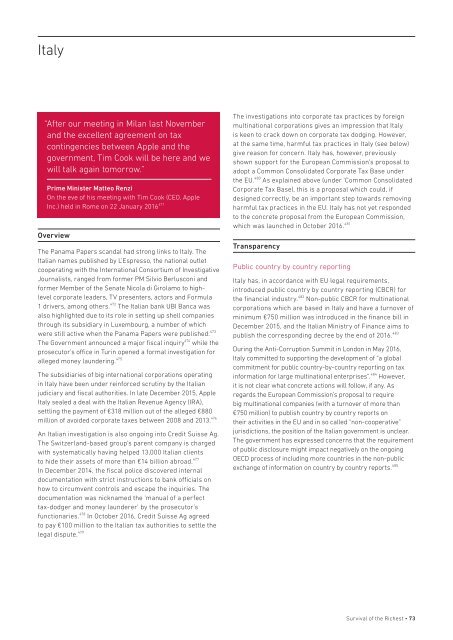You also want an ePaper? Increase the reach of your titles
YUMPU automatically turns print PDFs into web optimized ePapers that Google loves.
Italy<br />
“After our meeting in Milan last November<br />
and <strong>the</strong> excellent agreement on tax<br />
contingencies between Apple and <strong>the</strong><br />
government, Tim Cook will be here and we<br />
will talk again tomorrow.”<br />
Prime Minister Matteo Renzi<br />
On <strong>the</strong> eve <strong>of</strong> his meeting with Tim Cook (CEO, Apple<br />
Inc.) held in Rome on 22 January 2016 471<br />
Overview<br />
The Panama Papers scandal had strong links to Italy. The<br />
Italian names published by L’Espresso, <strong>the</strong> national outlet<br />
cooperating with <strong>the</strong> International Consortium <strong>of</strong> Investigative<br />
Journalists, ranged from former PM Silvio Berlusconi and<br />
former Member <strong>of</strong> <strong>the</strong> Senate Nicola di Girolamo to highlevel<br />
corporate leaders, TV presenters, actors and Formula<br />
1 drivers, among o<strong>the</strong>rs. 472 The Italian bank UBI Banca was<br />
also highlighted due to its role in setting up shell companies<br />
through its subsidiary in Luxembourg, a number <strong>of</strong> which<br />
were still active when <strong>the</strong> Panama Papers were published. 473<br />
The Government announced a major fiscal inquiry 474 while <strong>the</strong><br />
prosecutor’s <strong>of</strong>fice in Turin opened a formal investigation for<br />
alleged money laundering. 475<br />
The subsidiaries <strong>of</strong> big international corporations operating<br />
in Italy have been under reinforced scrutiny by <strong>the</strong> Italian<br />
judiciary and fiscal authorities. In late December 2015, Apple<br />
Italy sealed a deal with <strong>the</strong> Italian Revenue Agency (IRA),<br />
settling <strong>the</strong> payment <strong>of</strong> €318 million out <strong>of</strong> <strong>the</strong> alleged €880<br />
million <strong>of</strong> avoided corporate taxes between 2008 and 2013. 476<br />
An Italian investigation is also ongoing into Credit Suisse Ag.<br />
The Switzerland-based group’s parent company is charged<br />
with systematically having helped 13,000 Italian clients<br />
to hide <strong>the</strong>ir assets <strong>of</strong> more than €14 billion abroad. 477<br />
In December 2014, <strong>the</strong> fiscal police discovered internal<br />
documentation with strict instructions to bank <strong>of</strong>ficials on<br />
how to circumvent controls and escape <strong>the</strong> inquiries. The<br />
documentation was nicknamed <strong>the</strong> ‘manual <strong>of</strong> a perfect<br />
tax-dodger and money launderer’ by <strong>the</strong> prosecutor’s<br />
functionaries. 478 In October 2016, Credit Suisse Ag agreed<br />
to pay €100 million to <strong>the</strong> Italian tax authorities to settle <strong>the</strong><br />
legal dispute. 479<br />
The investigations into corporate tax practices by foreign<br />
multinational corporations gives an impression that Italy<br />
is keen to crack down on corporate tax dodging. However,<br />
at <strong>the</strong> same time, harmful tax practices in Italy (see below)<br />
give reason for concern. Italy has, however, previously<br />
shown support for <strong>the</strong> European Commission’s proposal to<br />
adopt a Common Consolidated Corporate Tax Base under<br />
<strong>the</strong> EU. 480 As explained above (under ’Common Consolidated<br />
Corporate Tax Base), this is a proposal which could, if<br />
designed correctly, be an important step towards removing<br />
harmful tax practices in <strong>the</strong> EU. Italy has not yet responded<br />
to <strong>the</strong> concrete proposal from <strong>the</strong> European Commission,<br />
which was launched in October 2016. 481<br />
Transparency<br />
Public country by country reporting<br />
Italy has, in accordance with EU legal requirements,<br />
introduced public country by country reporting (CBCR) for<br />
<strong>the</strong> financial industry. 482 Non-public CBCR for multinational<br />
corporations which are based in Italy and have a turnover <strong>of</strong><br />
minimum €750 million was introduced in <strong>the</strong> finance bill in<br />
December 2015, and <strong>the</strong> Italian Ministry <strong>of</strong> Finance aims to<br />
publish <strong>the</strong> corresponding decree by <strong>the</strong> end <strong>of</strong> 2016. 483<br />
During <strong>the</strong> Anti-Corruption Summit in London in May 2016,<br />
Italy committed to supporting <strong>the</strong> development <strong>of</strong> “a global<br />
commitment for public country-by-country reporting on tax<br />
information for large multinational enterprises”. 484 However,<br />
it is not clear what concrete actions will follow, if any. As<br />
regards <strong>the</strong> European Commission’s proposal to require<br />
big multinational companies (with a turnover <strong>of</strong> more than<br />
€750 million) to publish country by country reports on<br />
<strong>the</strong>ir activities in <strong>the</strong> EU and in so called “non-cooperative”<br />
jurisdictions, <strong>the</strong> position <strong>of</strong> <strong>the</strong> Italian government is unclear.<br />
The government has expressed concerns that <strong>the</strong> requirement<br />
<strong>of</strong> public disclosure might impact negatively on <strong>the</strong> ongoing<br />
OECD process <strong>of</strong> including more countries in <strong>the</strong> non-public<br />
exchange <strong>of</strong> information on country by country reports. 485<br />
<strong>Survival</strong> <strong>of</strong> <strong>the</strong> <strong>Richest</strong> • 73


